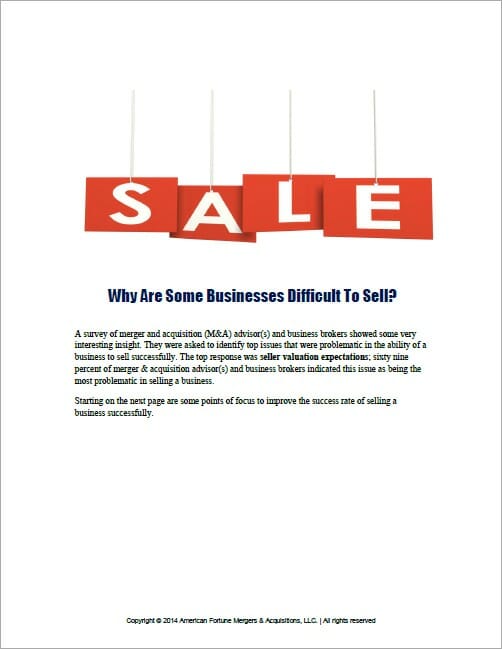 Eight Tips on How to Sell Your Business Successfully:
Eight Tips on How to Sell Your Business Successfully:
1. Price It Right.
A typical mergers and acquisitions consultant or business broker just can’t bring themselves to tell you that your business is overpriced. Don’t shoot your merger and acquisition advisors for valuing your business realistically and don’t choose a mergers & acquisitions advisor on the basis of which one values your business at the highest price just so that they can get a listing. The valuation and price of your business needs to be realistic. The best way to accomplish this is to have your business valued by a third party valuation expert knowledgeable in the science of business valuations as well as the market forces that shape the business valuation. Businesses that use a third party business valuation are much more likely to sell at a higher price. Those who do not use mergers & acquisitions advisor services or a qualified business broker combined with a third party business valuation service only have a 10% chance to sell a business at all.
Your tendency will be to overprice your business. Overpricing the business will result in taking a longer time to sell a business or it may never sell at all. Additionally, a business that stays on the market for more than 18 has an increased chance that employees, competitors, clients and other parties will learn that the business is listed for sale. Such information in the wrong hands could devastate the health of any business for sale. Furthermore, a business listed for sale for too long is often viewed by buyers as shopworn merchandise by the time if finally sells if it sells at all. Nothing raises the doubts of a prospective buyer more than to find out you’ve been trying to sell a business for a long time (18 months or longer). Prior to marketing the business for sale have a professional business valuation performed, a credible and defensible business valuation will greatly solidify a true market value of a business. Depending on the type of a business being valued and the detail and length of a valuation the price can be anywhere from $2,000 to $8,500. The money spent on a good business valuation will more than pay for itself in the end.
2. Fixtures, Equipment & Facility.
Business buyers expect that all the equipment be routinely serviced and in good working condition. Prepare detailed list of equipment with model numbers and serial numbers, buyers may also want to have a third party inspections as well a formal valuation of the equipment and fixtures. Businesses with clean financials, good records, clean facility and premises and good and up to date equipment will receive good consideration by buyers. Most buyers will likely deduct significant amount of deduction from the asking price if one or several areas of the business is not presentable or posse’s short comings.
3. Have A Good Reason To Exit & Sell A Business.
Buyers are always concerned about the reason for the sale of a business. They are afraid you may be selling a business because of a declining industry, the effects of globalization, competitor dominance or some undisclosed fact that may negatively effect and hurt the business in future years. Buyers want to hear a valid and logical reason for the sale. Without a good reason for a sale, business buyers may assume the worst and either offer you a lower price (valuation) or just walk away.
4. Form An Advisory Team.
To sell a business successfully you need to have the right group of experts. Start by searching for the services of a credible mergers & acquisitions advisor followed by an attorney with merger and acquisition transaction experience. Your accountant will also need to be involved in some aspects of the business sale. Your merger and acquisition advisor will play the most critical role in the sale of your business therefore, they need to be qualified and experienced with mergers and acquisitions services, exit planning, business valuation and many other matters so you can achieve a predictable and successful outcome in the sale of your business. Today, selling a business is so specialized it becomes imperative to engage the services of a mergers & acquisition advisor, investment banker or business broker (for retail or small businesses). The best attorney or accountant is no substitute for a specialized and knowledgeable merger and acquisition advisor who is experienced in all areas of selling businesses including business valuation, tax matters, deal structuring, problem solving and creative solutions.
5. Prepare A Good Marketing Package.
A good and proper marketing package to sell a business is absolutely critical. Additionally, being prepared to answer questions during the buyers due diligence process takes extensive preparation. To anticipate the buyers due diligence, its best to prepare a detailed offering memorandum package to present to buyers when marketing your business for sale. In the age of computers and readily available data and information, buyers can become quite informed. Business buyers will likely solicit a professional expert in business valuation services. The buyers and their experts will challenge you to justify your price and terms of sale based upon their understanding of normal investment returns and risk factors found in the open financial markets. Having a professional business valuation report will go a long way in defending your price against such challenges. You also have to compete for a prospective buyer’s attention against an ever-increasing number of sophisticated groups trying to sell other types of businesses and investments.
6. Target Buyer Prospects.
After you have performed a thorough review and due diligence and prepared a marketing package (offering memorandum), you are ready to sell your business and look for buyers. You must educate yourself about the types of buyers that exist in the market place. After studying buyers you will have a better idea which buyer to seek out for your business: a financial buyer, a corporate buyer, a private buyer or a strategic buyer. To assure that the buyer is qualified to buy and operate your business, you must learn how to carefully screen and qualify the buyer. Your mergers & acquisitions advisor or business broker can set-up a process to target and qualify these prospects. Desire to buy is not proof of a business buyers ability to buy and operate a business successfully. Be very careful in the review and qualification of buyers. Many buyers do not have the money, skills or vision to successfully buy and operate a business.
Depending on myriad factors, it may take 6 months to 2 years to sell a business. It is critical to keep your marketing efforts confidential except to very qualified prospects. A qualified mergers and acquisitions advisor will be aware of all of these issues and will walk you through the process of selling your business with successful results.
7. Negotiate Professionally.
When you identify an interested and qualified buyer prospect, plan your negotiation strategy carefully. Your mergers and acquisitions advisor will facilitate the process, so follow their advice. Remember that your goal is to sell a business and not beat the buyer at some negotiation game. You and the merger and acquisition advisor should carefully strategize on all of the negotiation points. Give in slowly and carefully and always ask for a concession point in exchange from the buyer and his team of advisors. Have clear goals in mind when selling a business and do not get hung up on technicalities otherwise you will win the battle but lose the war. Don’t allow yourself to get bogged down in disputes or become emotionally involved with the buyer. Don’t allow your ego and pride to distract you from satisfying your underlying goal when selling your business. You do not need to become friends with the buyer, but understanding their circumstances and goals will help you negotiate better. Focus the negotiation on things that are common to you and the buyer. Spend time brainstorming numerous options with your mergers and acquisitions advisor and you will likely come up with many solutions before deciding what to do about any particular problem. Begin by negotiating the easier points and then move to resolving the more difficult points.
8. Wrap-it-Up Quickly.
Even the best buyer prospects can change their minds overnight. After the buyer prospect makes a commitment to buy your business, get an offer to purchase in writing and get a good-sized, non-refundable earnest money deposit. After the offer to purchase agreement is signed begin to negotiate the finer points and begin the process of drafting a definitive sales agreement along with all of the other closing documents and prepare to close on the business as soon as possible. Your business isn’t sold until the money is in your hand. Make sure your check clears before you set plans in motion for investing, spending the money or taking a well deserved exotic vacation.
To learn more about selling a business successfully contact us at 502-244-0480.
By Brian S. Mazar, CBI, MBA
American Fortune
fortunebta.com






